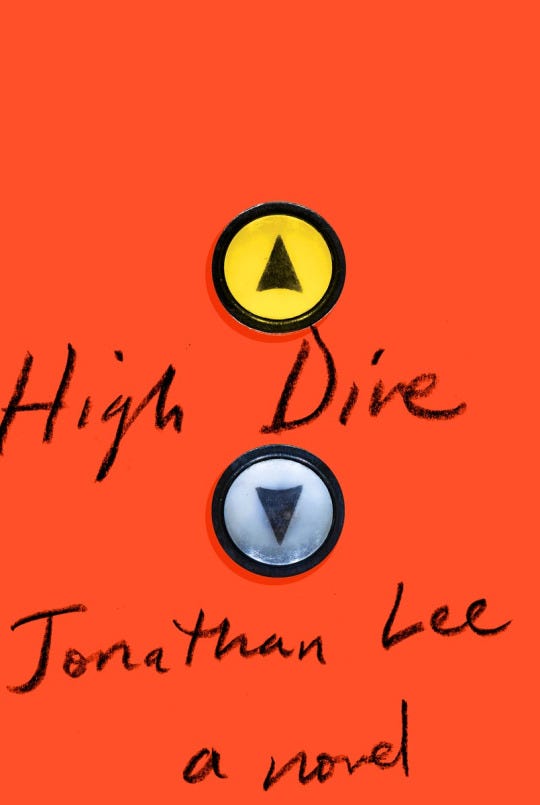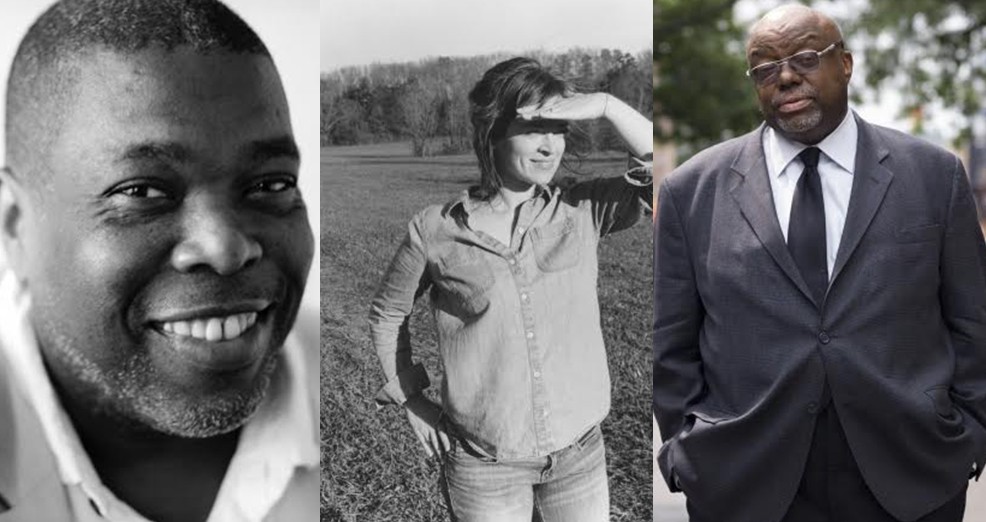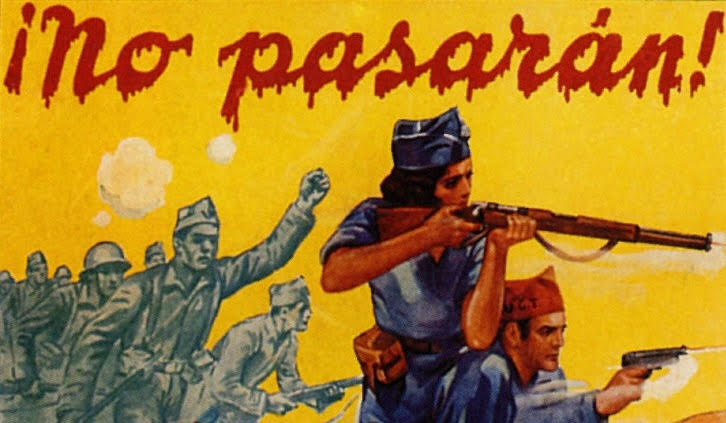Lit Mags
High Dive (Excerpt) by Jonathan Lee
A story about father figures

AN INTRODUCTION BY GARTH GREENWELL
Jonathan Lee’s brilliant, tense new novel weaves fiction around a real event: the attempted assassination of Margaret Thatcher in Brighton in 1984. It’s the stuff of political suspense, but in High Dive, Lee’s preoccupations are elsewhere: not with the machinations of assassination, though we see those, but instead with the intricate negotiations of daily life. Even when the novel presents scenes of violence or unrest, it’s as likely to dwell on a group of children playing as it is a man whose head is caved in by a brick. At every point the book reminds us that lives defined by a single moment — a man who sets a bomb, a man who is killed by it — are immeasurably richer than that moment.

The book follows three characters: a young IRA volunteer and the father and daughter who feature in this excerpt. Moose is the manager of the hotel in Brighton where the Prime Minister and her cabinet will stay; Freya, just out of high school, works the check-in desk, the boredom of the job broken by the occasional erotic flare with a guest or co-worker.
Their relationship is the heart of the book, and this short, tender scene captures much of what defines it. Moose is forty-five and unfit, but as a young man he was a champion diver; when he climbs the rungs of the high dive he’s sketching the shape of an old heroism. He knows he’s ridiculous; he also feels the pleasure of remembered skill. And all the time he’s performing for his daughter, who, it’s clear even from these few pages, for all her show of adolescent coolness adores him.
There’s an extraordinary discipline in Jonathan Lee’s refusal to neglect the lives of his characters for the sake of the grand drama his subject offers. And yet somehow, through his fine-grained attention to the light and shade of human feeling, Lee makes us reflect on the grandest and most intractable questions. Seldom has a novel made me feel so intensely the double binds of historical guilt or the utter inadequacy of all our moral accountings. High Dive is a gorgeous, compassionate book. Please read it.
Garth Greenwell
Author of What Belongs to You
High Dive (Excerpt) by Jonathan Lee
Jonathan Lee
Share article
Seven a.m. at the public pool, making good on his promise. Exercise, exercise! Well, he was exercising. Doing as his daughter advised. Around him were splashes, shouts. The clunky suck of wet feet walking. Shoulder-deep in water a thought came unrequested: Why not try a dive?
It had been a long time since his diving days. Confidence gets thin. He couldn’t picture himself doing the somersaults of old, but neither did he feel he belonged in the shallow end over there with the loose-skinned oldies, discussing Terry Connor and cancer. These men were the work of a half-hearted taxidermist; age had emptied them out. Five breathless lengths he’d spent trying to keep up with his daughter. It dampened a guy’s esteem to be panting after just five lengths. He hauled himself out of the pool and joined the queue for the tower, a line of lean boys waiting for a dive.
Wearing swimming trunks rescued from his thirties he was a magnet for their smirks. Fair enough. It was nice to be a magnet for something. There was a time when his stomach was a thing of alien precision. Crunches, kettlebell windmills, prone plank. Would any of these kids believe it? Why were they even awake at this hour? He thought the lady over there might be a teacher of some sort. Overhead a body fell through the air.
The high-dive platform was a long grey tongue stretching out from the top of the tower. Ten meters. Three stories high. A near-vertical metal ladder was the only way up. He stood in line and tried to look bored. Freya swam to the edge of the pool and watched him, head bobbing, a beautiful person he’d made. In response he extended his spine, puffed out his chest, becoming father-shaped. She continued swimming. Touching the wall, turning, breaking away. All of her freedom unthinking. Last night’s ale was thudding in his head, squashing fine memories of mozzarella.
When it was his turn to climb, each rung felt cold and hard under his feet. He took two rest stops to let out his smoker’s cough. Above him the grubby glass ceiling, September clouds breaking up beyond it, sunlight restless on tiles. There used to be a second pool next door where the women had to go. A few years ago they floored it over for badminton. Up high you could hear the dull pop-pop of the shuttlecock, the scribble-squeak of fast-moving shoes. Blinking, he clambered to stand.
That first look around: such a shot of eerie beauty. It took him straight into his past. Chlorine gave the air up here a hazy uncrackable quality, everything a chemical blue. The only higher creature was a seagull relaxing in the rafters. Trapped and relaxed: it made no sense to Moose.
The kid in front of him had loosely knitted limbs, that slouchy bellboy way of making youth seem like a secret, and when he reached the end of the platform he pulled a pair of red goggles over his mop of dark hair and turned and said, “Do you think my watch will make it? This says, like, ten meters resistant.”
“Should be OK.”
“Yeah?”
“Yeah.”
As Red Goggles retied the cords of his shorts Moose inevitably gave in to the impulse to look down. He was surprised to find himself beginning to reel — arms out for balance, take a breath. With slow caution he glanced again. A number of colored floats and armbands down there now. The landlord of the Cricketers flirting with a hefty lady. Freya standing on the tiled lip of the pool, arms crossed. This was a place of echoes and the achievement of private targets. If someone’s foot touched your foot, they apologized profusely.
It was supposed to be only two at a time up here but with Red Goggles hesitating, trembling, a new person arrived on the platform. He was a squat Coke can of a man on whom a desperately stretched swimming cap sat. The first thing he did was explain he didn’t have all day. Then he looked around, his knees seemed to go soft, and with a shudder and a muttered “fuck” he took the ladder back down. When Moose stopped smiling it occurred to him to do the same. Pride before a fall.
Red Goggles was finally primed to jump. “Fear does not exist in this dojo!” he cried, and with that announcement he cannonballed out of sight. He wailed all the way down and the impact, when it came, was closer to a crash than a splash. Sparks of water flew up. The surface healed.
The way the warm platform eats up the evidence of your presence. The way it shrinks your footprints to the size of a child’s, then an animal’s, then a nothing. The water was a tiny cool blue sheet that seemed, in these moments, to want to break your smallest bones. His heart was beating light and fast and a shift of cloud threw half the pool into shadow.
On the tip of the platform were two dusky oval shapes formed by all the feet that had gone before. He settled his soles on these ovals, blinked to stop the walls turning. He did his first high dive at the age of twelve, looking at his own awkward knees and rubbing his sweaty palms against his stomach, his father cheering him on from below. His father who seemed to come alive when watching his son succeed, a man usually so carefully contained within himself, shy and jokey and perhaps a little bitter, sharp features that made his moods look worse than they were.
Hurl yourself into the soundless blue or take the ladder back down. No-no-no and yes-yes-yes.
Oh, fuck it. Always was an over-thinker.
He was only forty-five and there was nothing much wrong with his muscles and Moose now found the arrogance to bounce, to ask the air for eloquence, just like he used to do over and over when competing at a meet. As his feet began to leave the platform he knew he was getting only half the push he used to get but he was up now, up, blood hurtling through his body — the friction of travel in his teeth.
Yes, he thought. This is what it’s like.
Loosely bound to the room around him now, held by no ties at all, everything hushed and hesitant as it is before an accident. He tucked into a somersault, drew his knees into his chest, fingertips touching shins. Sky. Tiles. The whole gleaming ceiling of this old public pool. Colors bled into one another as a second somersault came. Through his knees a flash of water as he tumbled towards the tank. Fast now. The wind-rush. Steady.
Spotting the ceiling for the final time he moved from tuck to open pike. His body thinned as he arced down into the pool with the beauty — the overdetermination — of a dream. Forty miles an hour. Back straight and toes together. Hands angled to make a hole he could climb inside. For a moment he was Louganis, gunning for gold, an odd hovering perspective on himself. The water opened without protest. The warm green world took his weight.
Advice from his old coach Wally came to mind. Bending your back underwater gets your shins to vertical. Spreading your arms stops air bubbles breaking upward. Heart beating quick in the deep, feeling himself starting to smile, water creeping in through his lips as he awarded himself a 7 out of 10.
Moose lingered beneath the surface a little longer than necessary, enjoying the leggy shadows and livid pools of light. He broke into the sharper air, drew breath. Blurred shapes became precise. The lifeguard seemed to be clapping and the boy next to Red Goggles cried “Skill!”
Poolside he stood tall, water streaming from his body, the bones in his chest on fire.
“Show-off,” Freya said.
“Sportsman,” he replied, panting.
“Big splash.”
“Untrue.”
“No water left in the pool.”
He risked a glance at the tank and saw that it was full. He told her she wasn’t a very supportive daughter. In response she touched a throbbing vein in his shoulder. “Huh,” she said, very thoughtfully. There were moments when love burned up in his throat and he didn’t quite know how to move.








